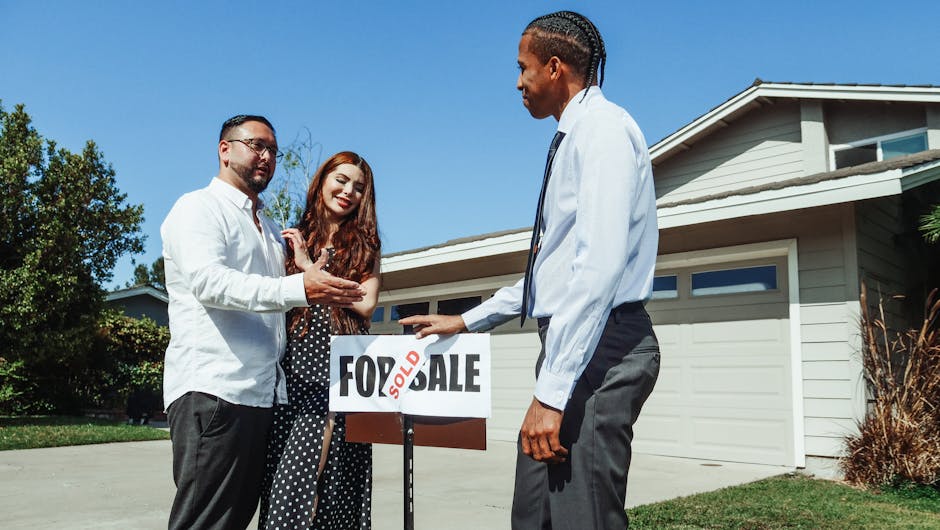Finding Your Perfect Advocate in the Home Buying Journey

The best buyer’s agent is someone who exclusively represents your interests as a homebuyer, has deep local market knowledge, strong negotiation skills, and excellent communication. Here’s what makes a buyer’s agent truly exceptional:
- Exclusive representation – Works solely for you with no conflicts of interest
- Local expertise – Knows neighborhoods, pricing trends, and hidden opportunities
- Negotiation skills – Saves you money through strategic offers and counteroffers
- Communication style – Responsive, clear, and aligned with your preferences
- Experience level – Completes around 20 transactions annually (balancing expertise with availability)
Buying a home is likely one of the largest financial decisions you’ll ever make. In today’s complex real estate market, having a dedicated professional by your side can make all the difference between a stressful experience with costly mistakes and a smooth journey to homeownership.
“If you think a buyer’s agent just opens doors and collects a check at closing, you’ve never had the pleasure of working with a truly great one,” notes one industry expert. The right buyer’s agent serves as your advocate, advisor, and negotiator throughout the entire process.
According to the National Association of REALTORS®, 90% of buyers said their agent was a useful source of information when navigating the home-buying process, and the same percentage would either use their agent again or recommend them to others.
While many buyers begin their search online (41% according to recent data), having an experienced professional to guide you through inspections, negotiations, and closing can save you thousands of dollars and countless headaches.

Terms related to best buyer’s agent:
What Does a Buyer’s Agent Actually Do & Why They Beat the Listing Agent
Ever wondered why you can’t just work with the agent whose name is on the “For Sale” sign? When you’re making one of the biggest purchases of your life, having the best buyer’s agent in your corner makes all the difference.
Fiduciary Duty: Your Interests Come First
Think of a buyer’s agent as your personal advocate with legal backing. They’re obligated to put your interests above everything else. This means:
- They keep your financial details and negotiation strategy private.
- Their loyalty belongs to you alone – not their commission check.
- They exercise careful attention to detail throughout your home-buying journey.
- They must disclose anything that might impact your decision.
Meanwhile, that listing agent? Their legal duty is getting the seller top dollar – which is exactly the opposite of what you want!
The Full-Service Package
A truly best buyer’s agent does so much more than open doors and hand you property flyers.
They become your property matchmaker, filtering through listings to find homes that match your wish list and budget. This saves you from endless scrolling through properties that would never work.
When you find “the one,” they develop smart pricing strategies based on comparable sales data so you don’t overpay. Their negotiation skills often save buyers thousands – whether on purchase price, repair credits, or closing timelines.
During inspections, your agent becomes your second set of eyes, helping interpret findings and spotting potential issues. They’re also your deadline keeper during escrow, ensuring all contingencies are handled properly and on time.

The Dual Agency Trap
Here’s a situation to avoid: dual agency – when one agent represents both buyer and seller in the same transaction. While legal in some states, it creates an impossible situation. How can someone negotiate the highest price for the seller while also getting you the lowest price?
As one experienced agent puts it: “A single firm can’t ethically represent both buyer and seller without potential conflict.” This is precisely why the best buyer’s agents often work exclusively with buyers.
Recent research on dual agency confirms what many industry professionals have long known – buyers with dedicated representation typically report higher satisfaction with their purchase and often save more money through effective negotiation.
And while 41% of today’s buyers start their search online, having a professional guide for the inspection, negotiation, and closing stages proves invaluable. The complexity of modern real estate transactions makes professional guidance more important than ever.
The Best Buyer’s Agent Checklist: Skills, Credentials, Costs & Ethics
Finding a great real estate agent isn’t just about who has the flashiest website or the most bus-bench ads. When you’re making one of life’s biggest purchases, you need someone with the right mix of skills, credentials, and ethics in your corner.
Essential Skills
Think about your ideal home-buying partner. They would certainly be an excellent communicator, right? The best buyer’s agents respond promptly whether you prefer texts, emails, or calls. They translate real estate jargon into plain English and keep you informed without overwhelming you.
Beyond communication, local knowledge is priceless. A top-notch agent doesn’t just know property values – they know which elementary school has the best music program, which streets get backed up during rush hour, and which neighborhoods have exciting development plans.
When it comes to market analysis, exceptional agents don’t just tell you what’s happening – they show you why it matters for your purchase. They’ll explain how interest-rate trends might affect your buying power or why certain neighborhoods are appreciating faster than others.
Negotiation prowess might be the skill that literally pays for itself. Great agents tailor their approach based on the seller’s motivation, potentially saving you thousands on purchase price, repairs, or closing costs.

Credentials That Matter
When evaluating potential agents, certain professional designations signal a commitment to excellence:
- ABR (Accredited Buyer’s Representative) – specialized training in representing buyers
- CRS (Certified Residential Specialist) – advanced training in residential real estate
- SRES (Seniors Real Estate Specialist) – expertise in helping mature buyers
NAR membership means your agent adheres to a strict Code of Ethics, giving you additional protection. According to research from the National Association of REALTORS®, agents with professional designations typically complete more transactions and provide more comprehensive service.
Understanding Costs & Compensation
Here’s some good news about working with the best buyer’s agents: you typically don’t pay them directly. Most buyer’s agents receive payment through a commission split with the listing agent – usually 2.5-3% of the purchase price, paid by the seller at closing.
Some agents offer alternative compensation models. You might encounter flat-fee arrangements, hourly rates, or a retainer plus reduced commission. Whatever the structure, transparency is key. Great agents clearly explain their compensation and exactly what services you’ll receive in return.
Ethical Considerations
Ethics might not be the flashiest topic, but it’s arguably the most important. The best buyer’s agents demonstrate their commitment to your interests by refusing dual-agency situations that create conflicts of interest. They’ll disclose any personal connections to properties they show you and maintain strict confidentiality about your financial situation.

9-Step System to Find and Hire Your Best Buyer’s Agent
Finding the best buyer’s agent isn’t something that happens by chance. It’s a deliberate process that requires some homework on your part. I’ve broken it down into a manageable system that will help you find your perfect real estate partner.
Step 1: Define Your Needs and Communication Style
Before you start interviewing agents, take a moment to reflect on what you really want. Are you the type who prefers quick text updates, or do you want detailed phone calls? Do you need someone who will hold your hand through every step, or do you prefer more independence?
Think about your timeline too. Are you in a rush to buy, or taking your time? Being clear about these preferences upfront will save you from mismatched expectations later.
Step 2: Leverage Technology for Initial Research
The digital age has made agent research so much easier! Start by browsing platforms like Zillow, Realtor.com, or Redfin to view agent profiles in your area. Pay attention to their production statistics – how many homes have they helped buyers purchase recently?
Client reviews can be gold mines of information. Look beyond the star ratings to the actual comments. Are people praising their negotiation skills or their responsiveness?
Step 3: Gather Social Proof
There’s nothing quite like a personal recommendation. Reach out to friends, family members, and colleagues who’ve recently purchased homes. Ask them specifically what made their agent exceptional – was it their availability? Their knowledge? Their patience?
Just remember that what worked for your cousin might not work for you if your needs are different.
Step 4: Conduct a Yard-Sign Audit
This old-school technique still works wonders! Drive through your target neighborhoods and notice which agents have multiple “For Sale” signs. This usually indicates they have deep knowledge of that specific area.
Open houses are another opportunity to meet agents in their natural habitat. Stop by, observe how they interact with visitors, and grab their card if you’re impressed.
Step 5: Verify Credentials and Complaints
Now it’s time for some due diligence. Check your potential agent’s license status through your state’s real estate commission website. You can also search the ARELLO (Association of Real Estate License Law Officials) database to verify their standing.
Don’t skip checking the Better Business Bureau for any complaints. Also verify those professional designations they’re advertising.
Step 6: Create a Shortlist and Schedule Interviews
Based on your research, narrow down your choices to two or three promising candidates. Prepare specific questions, and schedule face-to-face or video meetings.
Pay attention to how promptly they respond to your interview request and how prepared they seem when you meet.

Step 7: Evaluate Compatibility and Expertise
During your interviews, notice how well they listen to your needs. Do they ask thoughtful questions about your situation, or do they just launch into their sales pitch? Trust your gut feeling about whether you’d enjoy working with this person through what can be a stressful process.
Test their knowledge of your target neighborhoods. A truly local expert should be able to discuss school ratings, upcoming developments, traffic patterns, and even which coffee shops are worth visiting!
Step 8: Review the Buyer-Broker Agreement
When you’ve found a promising agent, carefully review their buyer-broker agreement. Understand how long you’re committing to work with them, and what happens if things don’t work out.
Make sure you’re clear on how they’ll be compensated and whether you’ll be working directly with the agent you’ve chosen or handed off to team members.
Step 9: Make Your Decision and Formalize the Relationship
Finally, trust your instincts about which agent feels like the best fit. Sign the buyer-broker agreement with your chosen professional, but first establish clear expectations about communication frequency and search parameters.
Frequently Asked Questions About Working With the Best Buyer’s Agent
Do I Pay a Commission or Does the Seller Cover the Best Buyer’s Agent?
One of the most beautiful things about working with a best buyer’s agent? In most cases, you don’t pay them directly out of pocket!
Here’s the good news about how agent compensation typically works: The seller usually covers the commission for both their listing agent and your buyer’s agent. When a seller lists their home, they agree to a total commission (generally 5-6% of the sale price) that gets split between both agents involved in the transaction. Your best buyer’s agent typically receives about 2.5-3% of the sale price, paid from the seller’s proceeds at closing.
“But wait,” you might be thinking, “doesn’t that commission ultimately come from the money I’m paying for the house?” You’re not wrong to wonder about this. The commission structure can influence the final sale price, and some savvy buyers negotiate seller concessions or closing credits that effectively offset part of this cost.
Some alternative arrangements do exist outside the traditional model:
- Flat-fee services where you pay your agent a set amount directly
- Hourly consulting arrangements if you only need limited services
- Agreements where you cover the difference if a seller offers less than the standard commission
What makes a best buyer’s agent stand out is complete transparency about how they get paid.
Can I Switch Agents If I’m Unhappy With My Current Representation?
Yes, you can switch agents if things aren’t working out, but there are some important things to know before making the leap.
First, pull out that buyer-broker agreement you signed and check the cancellation terms. Most agreements include provisions for termination if either party feels the relationship isn’t working.
Before you make any moves, have an honest conversation with your current agent about your concerns. You might be surprised how many issues can be resolved through clear communication. As one experienced agent puts it, “Sometimes what seems like neglect is just a misunderstanding about communication preferences.”
If you do decide to move on, provide written notice as specified in your agreement. Be aware of something called “procuring cause” – if your original agent showed you the home you eventually purchase, they may still be entitled to compensation even after you switch.
How Early Should I Sign a Buyer-Broker Agreement?
“When should I make it official with my agent?” It’s a bit like dating – some people want commitment right away, while others prefer to test the waters first.
The timing of signing a buyer-broker agreement depends on several factors:
- In competitive markets where homes sell quickly, securing representation early gives you an advantage – your best buyer’s agent will be fully committed to your search and can move fast when the perfect property appears.
- Many buyers prefer to “test drive” an agent by viewing a few properties before formalizing the relationship. This is perfectly reasonable, but be upfront about your intentions. Most best buyer’s agents will want an agreement before investing significant time in your search, particularly before writing offers.
When you do sign, look for agreements with reasonable timeframes (30-90 days is common) and clear termination clauses. The agreement should clearly outline what services the agent will provide, geographic areas covered, property types included, compensation structure, and duties of both parties.
A buyer-broker agreement isn’t just about securing the agent’s commission – it legally obligates them to represent your best interests. As the National Association of REALTORS® explains, these agreements create mutual protections that benefit both parties.
Conclusion
Finding the best buyer’s agent isn’t just another step in your home-buying journey – it’s the foundation that can make everything else fall into place. When you partner with the right agent, you’re not just getting someone who opens doors and handles paperwork; you’re gaining an advocate who will stand in your corner through what might be the biggest financial decision of your life.
Throughout this guide, we’ve explored what truly matters when selecting your real estate partner. The best buyer’s agents wear many hats: fierce negotiator, local expert, responsive communicator, and trusted advisor. They work exclusively for you, putting your interests above all else – including their commission check.
What makes this relationship so valuable is that it typically costs you nothing out-of-pocket. The seller usually covers your agent’s commission, giving you expert guidance without adding to your closing costs.
Finding this perfect match doesn’t happen by accident. The systematic approach we’ve outlined – researching credentials, conducting thoughtful interviews, verifying experience, and assessing personal compatibility – helps ensure you don’t leave this crucial decision to chance.
The buyer-broker agreement formalizes this relationship, creating clarity for both parties. It’s not just paperwork – it’s peace of mind, establishing exactly what you can expect from your agent and what they’ll deliver throughout your journey.
When you work with a truly exceptional buyer’s agent, the benefits extend far beyond just finding a house. They help you avoid costly pitfalls, negotiate better terms, and steer the inevitable bumps along the way with confidence and calm.
Here at YourGuideToRealEstate.net, we believe everyone deserves the confidence that comes with proper representation. Whether you’re buying your first starter home or your forever dream house, having the best buyer’s agent by your side transforms the experience from overwhelming to exciting.
Ready to take this important next step? We’ve got additional resources to help you move forward with confidence:
- Find Buyer’s Agent
- How to Choose the Right Real Estate Agent: A Complete Buyer’s Guide
- First-Time Homebuyer Tips
- More info about must-have agent skills



















